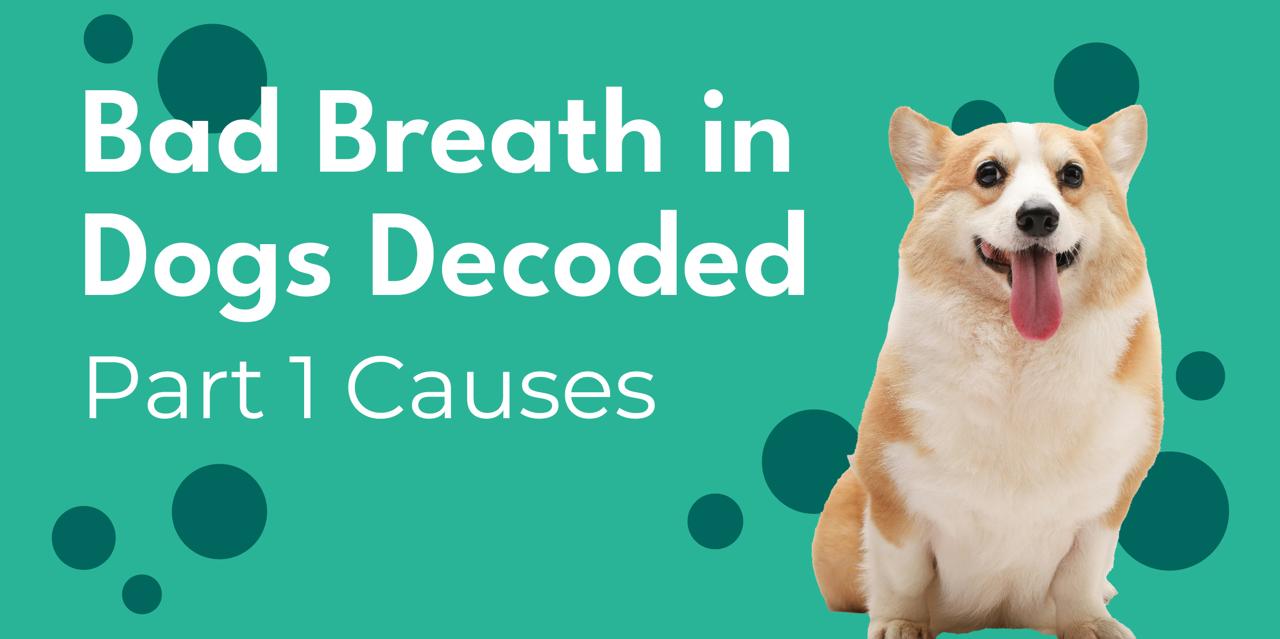

· By Anthony Gatti
Bad Breath in Dogs Decoded: Causes
Hey there, fellow dog parents! Let’s talk about something no one wants to admit but everyone deals with – stinky dog breath. You love your furry friend, but sometimes those kisses are, well, less than pleasant. Don’t worry, in this week’s PetPax Co. Paper, we’ve got you covered with everything you need to know about what causes bad breath in dogs, from dental disease to underlying health issues. Let’s dive in!
Causes of Bad Breath in Dogs
Dental Disease
Dental disease is by far the most common culprit of dog bad breath. Several dental issues can contribute to this problem:
Plaque and Tartar Buildup
When food particles and bacteria accumulate on your dog’s teeth, they form a sticky film known as plaque. If not removed through brushing, plaque hardens into tartar. Tartar causes gum inflammation, leading to gingivitis and ultimately bad breath. These aren’t just cosmetic concerns; they can harbor harmful bacteria that contribute to poor oral hygiene in dogs.
Gingivitis
Gingivitis is the inflammation of the gums and is an early stage of periodontal disease. It’s characterized by red, swollen gums that are prone to bleeding. This condition results from plaque buildup at the gum line. If you notice your dog’s gums are red or bleeding, it’s time for a dental check-up. Chronic bad breath in dogs is often a sign of gingivitis setting in, and without intervention, it can progress to more severe dental issues.
Periodontal Disease
If gingivitis is left untreated, it can develop into periodontal disease. This advanced infection damages the structures supporting the teeth. The gums, ligaments, and bones that hold the teeth in place become infected and inflamed, leading to significant pain and tooth loss. Severe bad breath in dogs is a common symptom, and periodontal disease can also allow bacteria to enter the bloodstream, affecting other organs.
Tooth Infections and Abscesses
Tooth infections and abscesses are serious conditions that can produce a foul odor. An abscess is a pocket of pus that forms in the tissue, usually due to a bacterial infection. This can be extremely painful for your dog and often requires immediate veterinary care. Infected teeth and abscesses can lead to serious health issues in dogs if not treated promptly.

Underlying Health Issues
Bad breath in dogs can be more than just an annoyance – it can sometimes indicate underlying health problems that require immediate attention.
Diabetes
If your dog suddenly has a sweet or fruity breath odor, it can be an early sign of diabetes in dogs. This occurs because diabetic dogs often have high levels of ketones in their blood, leading to a condition known as ketoacidosis. If your dog’s breath smells unusually sweet, consult your vet as soon as possible. Other symptoms of diabetes to watch for include excessive thirst, frequent urination, and unexplained weight loss.
Kidney Disease
If your dog’s breath has a strong ammonia-like odor, it could indicate kidney disease in dogs. The kidneys filter waste products from the blood, and when they’re not functioning properly, toxins can build up in your dog’s body, leading to an unpleasant breath odor. Kidney disease is a serious condition that can affect your dog’s overall health and quality of life, so early detection and management are crucial.
Liver Disease
Liver disease in dogs can cause bad breath, often accompanied by symptoms like vomiting, diarrhea, and jaundice (yellowing of the eyes or gums). The liver detoxifies the body, but when it’s not working correctly, toxins accumulate and contribute to bad breath. A dog with liver disease may also show signs of lethargy, loss of appetite, and weight loss.
Gastrointestinal Issues
Digestive issues in dogs can also lead to bad-smelling breath. If your dog has a gastrointestinal problem, such as an upset stomach, bloating, or chronic conditions like inflammatory bowel disease (IBD), the bacteria in the gut can cause an unpleasant odor noticeable in their breath. This type of bad breath is often associated with vomiting, diarrhea, or changes in appetite.
Respiratory Infections
Respiratory infections in dogs, such as sinusitis or rhinitis, can also cause bad breath. These infections lead to the buildup of bacteria in the nasal passages or throat, resulting in a foul odor emanating from the mouth. If your dog is experiencing nasal discharge, coughing, or difficulty breathing along with bad breath, it’s important to visit the vet.
Oral Tumors
Though less common, oral tumors in dogs can be a source of bad breath. These growths can become infected or necrotic (dead tissue), leading to a foul odor. If you notice that your dog has bad breath along with symptoms like drooling, difficulty eating, or visible lumps in the mouth, it’s important to have your dog examined by a vet.
Toxins and Poisons
Ingesting certain toxins or poisons can also cause bad breath in dogs. For example, if a dog ingests antifreeze, which has a sweet odor, it can lead to severe health issues and bad breath. Other poisonous substances, like rodenticides or certain plants, can cause organ damage and result in bad breath as a secondary symptom.

Final Thoughts
Understanding the causes of bad breath in dogs is the first step toward ensuring their overall health and happiness. Whether it's a sign of dental disease, an underlying health issue, or simply a matter of what they’ve been eating, identifying the root cause of your pup's stinky mouth is essential. Remember, bad breath in dogs is more than just a nuisance—it can be a red flag for more serious health concerns. Stay vigilant, keep an eye on changes in your dog’s breath, and always consult your vet if you notice anything unusual. Your pup depends on you for their well-being, so let’s make sure they’re in the best shape possible!
Keep an eye out for next week’s article, where we discuss proactive steps that you can take to care for your dog’s oral health!
Written by Rhea Chandrachud